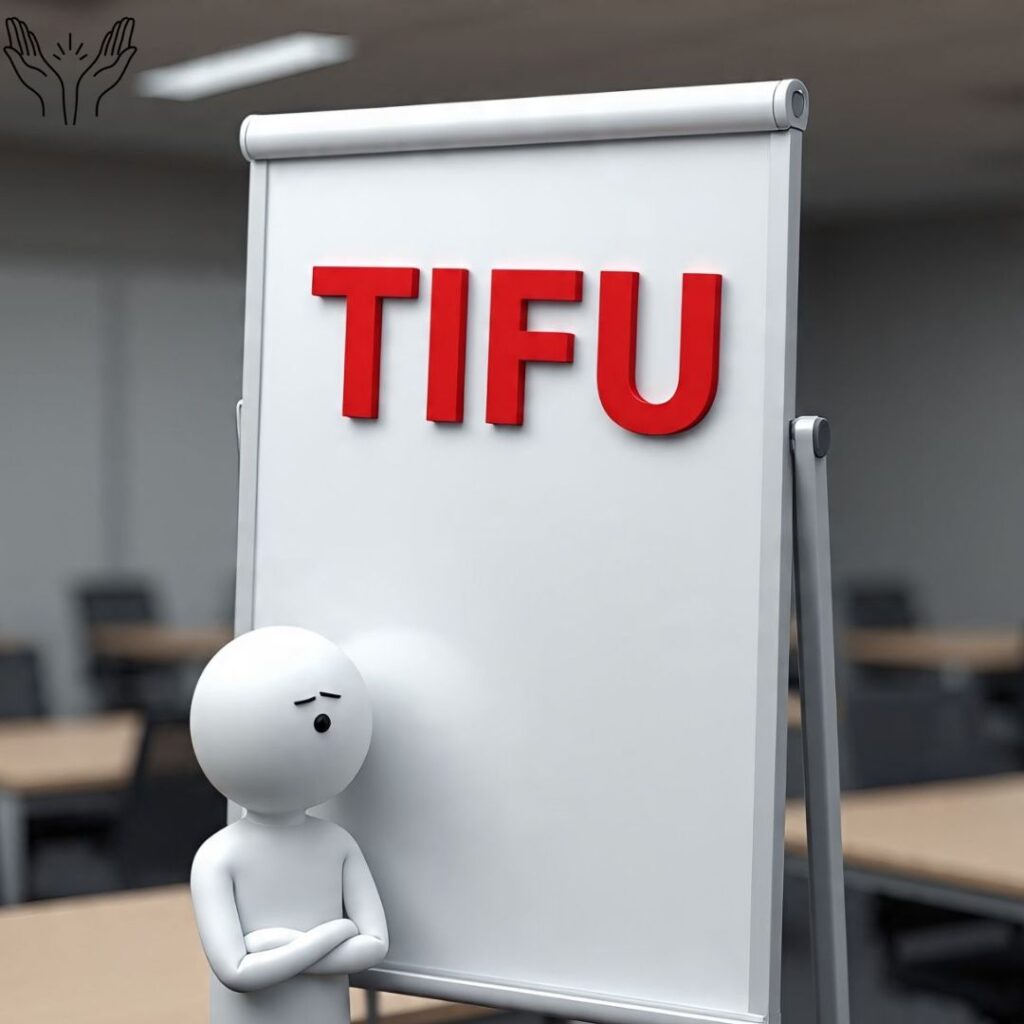TIFU has become one of the most recognizable internet acronyms of our time, spreading across social media platforms and embedding itself into everyday digital communication. But what exactly does TIFU mean, and why has it resonated so strongly with internet users worldwide?
In this comprehensive guide, we’ll explore the meaning behind TIFU, trace its fascinating journey from a niche Reddit community to mainstream internet culture, and examine why this simple acronym has become such a powerful tool for human connection in 2025.
🙏 Divine Prayer Generator
Select a prayer category to begin
The Origins of TIFU
TIFU stands for “Today I F***ed Up” a phrase that perfectly encapsulates those moments when we make mistakes, poor decisions, or find ourselves in embarrassing situations. The acronym represents more than just admitting fault; it’s about embracing vulnerability and finding humor in our human imperfections.
The concept behind TIFU taps into a universal human experience: we all make mistakes, and sometimes the best way to deal with them is to laugh about it. This simple yet profound idea has made TIFU incredibly relatable to millions of internet users who see their own experiences reflected in these stories.
What makes TIFU unique is its informal, conversational tone. Unlike formal apologies or serious confessions, TIFU stories are typically shared with a sense of humor and self-deprecation, making them more approachable and entertaining for audiences.
The Role of Reddit in Popularizing TIFU
Reddit’s r/TIFU subreddit, established in 2008, served as the birthplace and primary incubator for TIFU culture. This community created a safe space where users could share their most embarrassing moments without fear of harsh judgment.
The subreddit’s format was beautifully simple: users would write engaging stories about their mistakes, beginning with “TIFU by…” and then describe what went wrong. The community would respond with empathy, humor, and often their own similar experiences.
As Reddit’s user base grew exponentially, so did the popularity of r/TIFU. The subreddit now boasts millions of subscribers who actively participate in sharing, commenting, and voting on stories. This massive community has become a testament to our collective need to connect through shared experiences of failure and embarrassment.
The success of r/TIFU demonstrated that people crave authentic, vulnerable content that makes them feel less alone in their mistakes. This insight would later influence how the acronym spread to other platforms.
How TIFU Became a Cultural Phenomenon?
TIFU’s journey from Reddit to mainstream internet culture represents one of the most successful cross-platform migrations in internet history. The acronym’s versatility and universal appeal allowed it to adapt seamlessly to different social media environments.
Twitter users began incorporating TIFU into their tweets, often sharing quick, punchy stories of their daily mishaps. The character limit forced users to be creative and concise, leading to some of the most memorable TIFU moments in internet history.
TikTok creators embraced TIFU by turning these stories into visual content, acting out their embarrassing moments for comedic effect. This visual element added a new dimension to TIFU culture, making it more accessible to younger audiences who prefer video content.
The hashtag #TIFU became a viral phenomenon, with millions of posts across platforms. Celebrities and influencers began sharing their own TIFU moments, legitimizing the concept and encouraging their followers to be more open about their mistakes.
How TIFU is Used?

TIFU serves multiple purposes in digital communication. Primarily, it’s used as a storytelling device that immediately signals to the audience that they’re about to hear about a mistake or embarrassing situation. This framing creates expectation and often prepares readers for humor or entertainment.
The acronym also functions as a vulnerability signal – it tells others that the person sharing is willing to be open about their imperfections. This vulnerability often creates stronger connections between the storyteller and their audience.
TIFU stories typically follow a similar structure: setup, mistake, consequences, and often a lesson learned or humorous reflection. This format has become so standardized that readers instinctively know what to expect when they see “TIFU.”
Common Examples of TIFU
Real-world TIFU examples span every aspect of human experience:
Workplace Blunders: “TIFU by accidentally sending a complaint about my boss to my boss instead of my friend” – These stories resonate because workplace mistakes are universal fears.
Social Mishaps: “TIFU by waving back at someone who wasn’t waving at me” – These moments of social awkwardness are deeply relatable and often hilarious in retrospect.
Technology Fails: “TIFU by posting a private message as a public status” – In our digital age, these technology-related mistakes have become increasingly common.
Relationship Mistakes: “TIFU by forgetting my anniversary and trying to cover it up” – These stories often combine humor with genuine relationship insights.
Food Disasters: “TIFU by trying to impress a date with my cooking skills” – Food-related failures are universally understood and often visually funny.
TIFU in Memes and Online Culture
The memification of TIFU has created an entire subculture of content. Memes featuring TIFU scenarios have become incredibly popular, often exaggerating the embarrassment or consequences for comedic effect.
These memes serve multiple purposes: they provide entertainment, create shared cultural references, and normalize the experience of making mistakes. The visual nature of memes has helped TIFU reach audiences who might not engage with text-based stories.
TIFU memes often follow popular formats, adapting existing meme templates to tell stories of failure and embarrassment. This creative adaptation has kept the concept fresh and relevant across different internet trends.
The Psychology Behind TIFU
The psychology behind TIFU reveals fascinating insights into human behavior and social media culture. Sharing mistakes publicly satisfies several psychological needs that are fundamental to human nature.
Validation and Acceptance: When people share their mistakes and receive positive responses, it validates their experience and makes them feel accepted despite their flaws. This validation is particularly powerful in online environments where people often feel isolated.
Social Comparison: TIFU stories allow people to compare their experiences with others, often leading to the realization that everyone makes similar mistakes. This comparison reduces feelings of isolation and abnormality.
Attention and Engagement: Sharing dramatic or funny mistakes often generates significant engagement, satisfying the human need for attention and social interaction. This engagement can be addictive, encouraging more sharing.
Identity Construction: TIFU stories help people construct and present their identity as someone who is humble, self-aware, and capable of laughing at themselves. This identity is often more appealing than presenting as perfect or infallible.
The Role of Catharsis in TIFU Stories
Catharsis – the emotional release that comes from expressing difficult experiences – plays a crucial role in TIFU culture. Writing about embarrassing or painful experiences helps people process their emotions and move past negative feelings.
The act of turning a negative experience into an entertaining story transforms the meaning of the event. What was once purely embarrassing becomes a source of entertainment and connection, fundamentally changing how the person views their mistake.
Community response amplifies this cathartic effect. When people respond with empathy, similar stories, or gentle humor, it reinforces the healing process and helps the storyteller feel less alone in their experience.
TIFU’s Influence on Language and Communication
TIFU represents part of the broader evolution of internet language, where acronyms and abbreviations have become essential tools for efficient communication. This linguistic evolution reflects the unique demands of digital communication.
The success of TIFU has inspired countless other acronyms and shortened expressions. Terms like SMH (Shaking My Head), FOMO (Fear of Missing Out), and TBH (To Be Honest) follow similar patterns of condensing complex emotional states into easily recognizable abbreviations.
These acronyms serve as emotional shortcuts, allowing people to quickly convey complex feelings and situations. They also create in-group identity – people who understand these terms feel connected to internet culture and each other.
TIFU in Other Platforms
Each social media platform has adapted TIFU to fit its unique characteristics and user behaviors:
Instagram: TIFU stories often accompany photos or videos that document the aftermath of mistakes, creating visual narratives that are particularly engaging.
YouTube: Content creators have built entire channels around TIFU stories, either sharing their own experiences or reading submissions from viewers. These videos often receive millions of views.
TikTok: The platform’s short-form video format has given TIFU stories a new visual dimension, with creators acting out their mistakes or using creative editing to enhance the storytelling.
Facebook: TIFU posts on Facebook often generate extensive comment threads where friends and family share their own similar experiences, creating community conversations.
Misinterpretations of TIFU

Despite its popularity, TIFU is often misunderstood or misused. Some people assume that TIFU is only appropriate for major disasters or life-changing mistakes, when in reality, it’s often used for minor, everyday mishaps.
Others misinterpret TIFU as a form of attention-seeking or narcissism, failing to understand the vulnerability and community-building aspects of sharing these stories. This misunderstanding can lead to harsh judgment of people who share TIFU content.
Some users also struggle with the balance between humor and seriousness in TIFU stories. While most TIFU content is lighthearted, some stories deal with genuinely serious situations that require more sensitivity.
Is TIFU Always Lighthearted?
While TIFU stories are typically humorous, the acronym can also encompass more serious mistakes and their consequences. The key is in the presentation and the community’s response.
Serious TIFU stories often focus on lessons learned or personal growth rather than just entertainment. These stories can be powerful tools for sharing wisdom and helping others avoid similar mistakes.
The community’s response to serious TIFU stories is usually more supportive and less focused on humor. This flexibility allows TIFU to serve different purposes depending on the situation and the storyteller’s needs.
The Impact of TIFU on Online Communities
TIFU has become a powerful community-building tool that transcends traditional social boundaries. Shared experiences of failure and embarrassment create bonds between people who might otherwise never connect.
The vulnerability required to share TIFU stories creates deeper, more authentic connections than typical social media interactions. When someone shares an embarrassing moment, others feel permission to be equally vulnerable, creating a cycle of openness and connection.
TIFU communities often develop their own culture, inside jokes, and support systems. Regular contributors become recognized members of the community, creating social structures that mirror real-world relationships.
The Dark Side of TIFU
Despite its positive aspects, TIFU culture can sometimes have negative consequences. Oversharing personal information can lead to privacy concerns, especially when stories involve other people who didn’t consent to having their actions shared publicly.
Some TIFU stories can perpetuate harmful stereotypes or make light of serious issues. The pressure to create entertaining content can lead people to exaggerate or fabricate stories, undermining the authenticity that makes TIFU valuable.
The addictive nature of social media engagement can also turn TIFU sharing into a compulsive behavior, where people continuously seek validation through sharing increasingly dramatic or personal stories.
TIFU Beyond the Internet
The influence of TIFU has extended far beyond digital spaces, affecting how people discuss mistakes and failures in real-world conversations. The term has become shorthand for acknowledging errors with humor and self-awareness.
In workplace settings, people increasingly use TIFU-style storytelling to discuss mistakes in meetings or casual conversations. This approach can defuse tension and create more open, honest communication about failures and learning opportunities.
Educational environments have also embraced TIFU concepts, with teachers and students using similar approaches to discuss mistakes as learning opportunities rather than sources of shame.
From Meme to Movement: TIFU in Popular Media
TIFU has transcended its origins to become a recognized cultural phenomenon referenced in mainstream media, television shows, and news articles. This mainstream recognition has legitimized the concept and introduced it to audiences who might not be active on social media.
Books, podcasts, and documentaries have explored TIFU culture as a window into contemporary society’s relationship with failure, vulnerability, and community. These explorations have elevated TIFU from simple internet slang to a subject worthy of serious cultural analysis.
The commercialization of TIFU through merchandise, branded content, and entertainment properties shows how deeply the concept has penetrated popular culture.
Conclusion
TIFU represents more than just an internet acronym – it’s a cultural phenomenon that reflects our collective need for connection, authenticity, and humor in an increasingly digital world. By providing a framework for sharing mistakes and vulnerabilities, TIFU has created new forms of community and communication that transcend traditional social boundaries.
As we move further into 2025, TIFU continues to evolve, adapting to new platforms and technologies while maintaining its core appeal. The acronym’s success demonstrates the power of vulnerability in creating human connections and the importance of humor in processing life’s inevitable mistakes.

Daniel Miller is a passionate writer, SEO expert, and blogger, specializing in Bible verses, prayers, and faith-based content at PrayerVibe.







